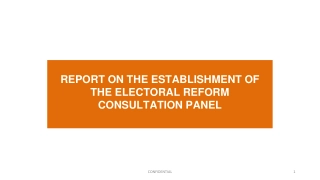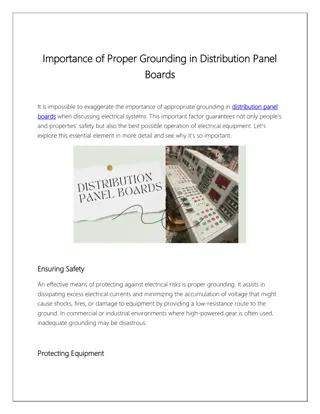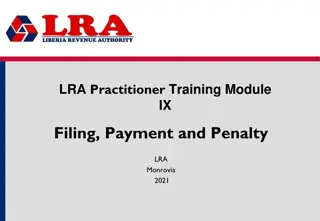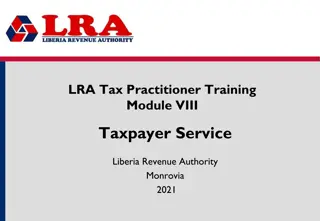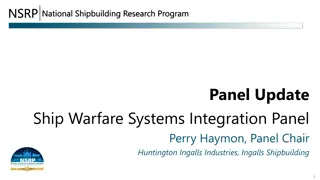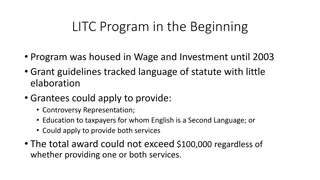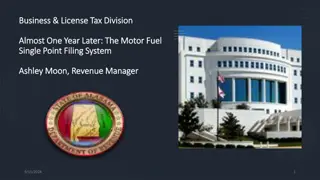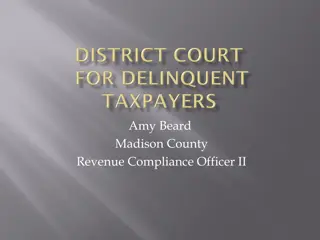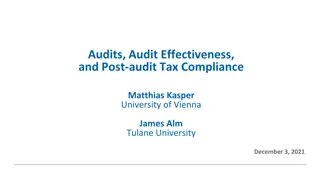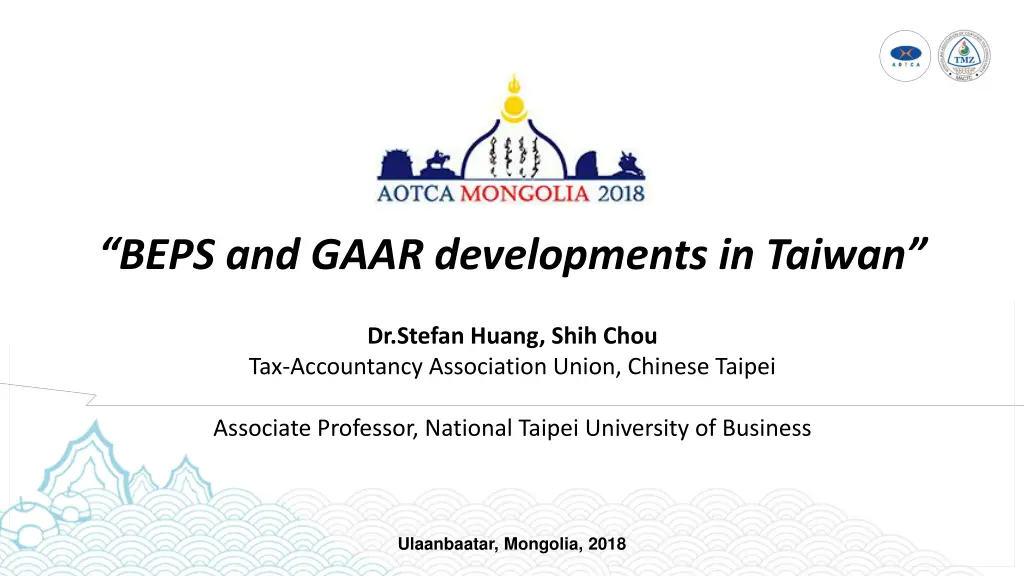
BEPS and GAAR Developments in Taiwan - Insights by Dr. Stefan Huang
Explore the latest BEPS and GAAR developments in Taiwan presented by Dr. Stefan Huang, with a focus on corporate tax regulation changes, thin-capital regime, CbC reporting, cross-border e-commerce, and GAARs. Gain valuable insights into the evolving tax landscape in Taiwan through this informative presentation.
Download Presentation

Please find below an Image/Link to download the presentation.
The content on the website is provided AS IS for your information and personal use only. It may not be sold, licensed, or shared on other websites without obtaining consent from the author. If you encounter any issues during the download, it is possible that the publisher has removed the file from their server.
You are allowed to download the files provided on this website for personal or commercial use, subject to the condition that they are used lawfully. All files are the property of their respective owners.
The content on the website is provided AS IS for your information and personal use only. It may not be sold, licensed, or shared on other websites without obtaining consent from the author.
E N D
Presentation Transcript
BEPS and GAAR developments in Taiwan Dr.Stefan Huang, Shih Chou Tax-Accountancy Association Union, Chinese Taipei Associate Professor, National Taipei University of Business Ulaanbaatar, Mongolia, 2018
Curriculum Vitae Educational Background LLM and jur. Phd of National Taiwan University, College of Law regular Visiting Scholar of International Tax Center Heidelberg Uni, International Tax Center of Max Planck Institute Munich. Work Experience Tax Attorney at PwC Taipei Office Assistant Professor, Associate Professor, Dean of Faculty of Tax Administration of NTUB 2014-2017 Lecturer at Judge s Academy, Finance Academy, IRS, Bar Association, CPA Association. Member of IFA Taipei, Deutsche Steuerjurist Gesellschaft Expertise Tax Litigation and Tax Planning International Taxation and Practice Journal Column Economic Daily, Tax Journal Magazine Publish Burden of Proof in Tax Litigation, Case Study on Tax Litigation Introduction of BEPS and Taxation on E-commerce, etc and 100+ articles Dr. Shih Chou, Huang Asso. Professor Faculty of Tax Admin. National Taipei University of Business +8862 23226385 +886920711411 shanehua@ntub.edu.tw
Content of Presentation 1. BEPS and Corporate Tax Regulation Changes in Taiwan 1. Thin-Capital Regime 2. CbC Reporting 3. CFC and PEM Regime 2. BEPS and Cross-Border E-Commerce 1. Simplified VAT Regime 2. Taiwan s EC Situation 3. EC s VAT compliance and E-Invoicing 4. Simplified Corporate Tax Regime 3. GAARs in Taiwan 1. Regulatory Background: Substance over Form Clause 2. Case 1: Uber VAT Case 3. Case 2: Triangle Trade and PEM 4. Conclusion: Low Profile and Pre-Consulting with Tax Authorities 02
BEPS and CIT in Taiwan: Thin-Capital Regulation 1. Beginning from the year 2011, excess interest shall not be considered as expense or loss if the proportion of related party debt to equity of a company exceeds a specified ratio. Related Parties Debt-Equity ratio is 3:1 2. If the thin-capital is met, the interest expense over 3:1 ratio shall be excluded. 3. Financial institutions are excluded from the application of Thin-Capital Regulation. 01
Taiwans BEPS development: CbC Reporting 1. Taiwan has implemented the three tiered TP documentation system . Multinational enterprises meet criteria shall report CbC, master file and local files. 2. Threshold for filing CbC report is 750 million Euros of yearly revenues beginning from the fiscal year of 2017. First CbC reporting shall be submitted in May 2018(Taiwan s tax season). 3. Even if a in Taiwan registered subsidiary of the MNE is exempted from CbC reporting, Taiwan tax authorities might request its parent company for CbC report. 4. Master file reporting has a threshold of NTD 3 billion(100 million USD) of revenue or NTD 1.5 billion(50 million USD) cross border controlled transactions. 02
Taiwans BEPS development: CFC Regime 1. Requirements for Controlled Foreign Company Taxation: directly or indirectly holding 50% of a foreign company. The controlled foreign company incorporated in low-tax jurisdiction-effective CIT rate below 14%. Earning of the fiscal year not exceeding 7 million NTD(230,000 USD) The controlled foreign company has no substantial activities 2. criterion for substantial activities Office and employees; and Passive income below 10% of revenue. 3. CFC Regime has enacted in 2016 but not be effective yet!!! 03
Taiwans BEPS development: PEM Regime 1. Requirements for Place of Effective Management Taxation: The significant decisions in business management, financial management, and personnel management is made by Taiwanese individuals or company. Financial statements, records of accounting books, minutes of meetings of the Board of Directors or minutes of meetings of the shareholders prepared or stored in Taiwan Major business activities carried out in Taiwan. 2. If PEM requirements meet: the foreign company will be deemed as domestic company and shall file and pay CIT per Taiwanese tax laws. 3. The same as CFC Regime, PEM Regime has enacted in 2016 but not be effective yet!!! 03
BEPS and Cross-Border E-Commerce: simplified VAT Regime Starting from 1 May 2017. Applicable only to : sales of digital services to domestic consumer. (Sales of physical goods via digital platform are subject to low value exemption.) Foreign enterprise, which has no PE in Taiwan but conducts cross-border sales of electronic services to local consumers. Cross-border EC-Platform shall be the VAT taxpayer and liable to VAT for sales of digital services. Registration Threshold: annually sales of NT480,000 (US16,000) Tax compliance (return filing and payment) shall be conducted on a bimonthly basis. 03
BEPS and Cross-Border E-Commerce: Taiwans EC Situation E-Commerce Business registered 88 business registered (end of Aug 2018) All Big Digital Players are onboard: Netflix(NL), Agoda(SG), E-bay(CH), Google Asia(SG), Expedia(SG), Valve(US), Apple Distribution(IE), Amazon(US, LU, JP), Alibaba(SG), Uber(NL), Facebook(IE) Airbnb(IE). Nationalities of registered business: Ireland, USA, Singapore, Netherland, Switzerland, Japan and others. Taiwan has tax treaties with NL, SG and CH. VAT Revenue from cross-border digital sales: Scale of Sales: 3 billion USD(2018 expected), and would result into 150 million USD in VAT collectible(VAT rate 5%). 03
ECs VAT compliance and E-Invoicing B2C E-Invoice is mounting-> 7 billion in 2017 VAT Invoices shall be issued in all B2C transactions. Cross-border EC shall issuing Electronic Invoice to consumers from 1.1.2019. 03
Taiwans B2C VAT Lottery Each VAT Invoice is with identical serial number .-2 digits English+8 digits Arabic numbers. Ex. FF-63845805 Identical serial numbers for B2C Invoice may win VAT lottery! 3% of VAT revenue goes to lottery. Lottery Awards from NT 200 to 10 million (6Euro- 300.000 Euro). Only 3-4 chance to wine NT200. Consumers are apt to donate VAT Invoice for charity. *Enterprise issuing E-Invoice bears the responsibilities to notify consumer of lottery awards! Otherwise it is liable for damages. 03
GAARs in Taiwan: Regulatory Background(1) Before 2009: Constitutional Interpretation recognized Substance over Form as legal principle applicable to taxation. Since 2009: Article 12-1 of Tax Collection Act has regulated, Substance over Form principle shall be applicable in following three situations: when tax authorities are interpreting tax laws; when tax authorities are reviewing the tax related fact. In such case, the tax liabilities shall be assessed in accordance of economic reality. when taxpayer is abusing the right to transactions and property arrangement. In such case, the tax liabilities shall be adjusted in accordance of regular transaction. * Tax authorities shall be the burden of proof while adopting Substance over Form rule. 03
GAARs in Taiwan: Regulatory Background(2) From the end of 2017, the Taxpayers Right Protection Act is effective. Article 7 further regulates the application of GAAR/Substance over Form rule: Reiterate the Substance over Form for tax law interpretation and fact finding. Define the elements of tax avoidance: Abuse the legal form Irregular transaction Acquired economic benefit but waived tax liabilities. In case of tax avoidance, tax liabilities shall be assessed in accordance with regular transaction and economic reality. Tax avoidance shall not be treated as tax evasion and only subject to a surcharge of 15% tax. In case of taxpayer withholding substantial tax facts from the tax authorities, the tax avoidance will be treated as tax evasion and further subject to tax penalty. Taxpayer may request tax authorities for tax ruling for the intended transaction. 03
GAAR Case 1: Uber VAT Case From 2013-2016, Uber BV(NL) was regarded to conduct transport service to Taiwanese consumers with the assistance of locally established Uber Taiwan a 100% owned subsidiary. Uber Taiwan provided only the so called non-core functions such as drivers recruiting, marketing and public relationship. Uber Taiwan only received cost reimbursement from Uber BV monthly. Contract, cash flow and drivers dispatch were all handled by Uber BV via online platform. Tax authorities applied the substance over form principle( GAAR ) to deem the Uber Taiwan shall be responsible for the related VAT. Uber Taiwan was assessed with NT 50 million VAT payable plus 1.5 times of tax penalty. The case was decided against Uber Taiwan in first instance but penalty was repealed by supreme administrative court. Though the arrangement of Uber was regarded as tax avoidance (artificially to avoid the PE constitution), it shall be treated differently from tax evasion on the ideas of Taxpayers Right Protection Act. 03
GAAR Case 2: Triangle Trade and PEM A Co. is incorporated in Taiwan and has set up a 100% owned paper company in BVI. A Co. was doing business with its clients in China and USA. A Co s business activities like purchase, order, OEM and payments were mostly handled under the name and OBU accounts of BVI paper company. The business profits arising therefrom were all stored in the OBU accounts of BVI paper company. In Taiwan s tax authorities perspective: Though the contracts signed, service and goods delivered and payments made were under the BVI company s name, all its management and decisions were done by A Co s officials. The BVI paper company was effectively managed as a nominee of A Co. The business profits should be deemed as A Co s taxable business income. Therefore, A Co was assessed 400.000 USD in corporate tax payable and further subject to tax evasion penalty. 03
GAAR Case 2: Triangle Trade and PEM Question of this case: Taiwan s PEM regime is not effective yet! Tax authorities bypassed PEM regime through GAAR! When PEM is applicable, in principle, it won t result in tax penalty . But this case was deemed as tax evasion through GAAR application. 03
Conclusion GAAR applications in Taiwan can bypass a lot of requirements laid down by tax laws. This tax law practice has increased much legal risk in tax planning. The solutions could be: Keep your business in low profile (vs the high-profiling Uber) When implementing new structures, shall be very aware of potential legal risk. Consult the tax authorities in first place if you concern the potential legal risk. 03

